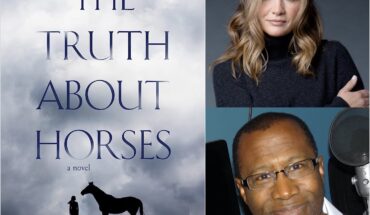There is nothing I detest more than tooting my own horn. Blame it on my ancestors, who would rather die than be caught being so jack-all-full-of-yourself as to sit down across from an agent to sell your work. The work, I can hear them sniffing, should speak for itself. And if it does not, well, there is your answer: Your work bites. Go dig a hole.
To get myself in the chair across from the agent and not feel like that there man, entrapped, squeezed, by one muscular octopus tentacle and surrounded by toothy sharks, has taken considerable work and massive coaching from wise and experienced friends. Here’s what I’ve learned.
Before Your Meeting: Assemble Your Toolkit
- Genre. If you don’t yet know your novel’s genre, check out agent Carly Watter’s handy-dandy Infographic: Do You Know The Difference Between Literary, Upmarket and Commercial Fiction? complete with comp titles. She makes it easy.
- Elevator Pitch. There are so many posts about how to write your pitch. One of my favorite how-tos comes from thriller author Jon Land: Paraphrasing. Stuff happens to people you care about. Give us the hero and their quest and you have not only told the agent what the book is about, but emotionally engaged the agent in the action. Find a pitch formula that works for you and get her done.
- Your Folder. Collect whatever you sent the agent: your query, your pitch, the first five or 10 or 20 pages of your manuscript. Put them in your folder. And, this is important, include a list of your questions for the agent. We’ll come back to this list of questions.
Now for the Psychological Toolkit
- What to Expect. And What Not To. If you anticipate the literary agent will rise from her (or his) chair and say, “I request your manuscript immediately,” you are liable to be disappointed. It happens, but rarely. What you’re seeking is a conversation, where you can benefit from the agent’s professional expertise. What’s working in my manuscript? In my query? And just as importantly, what’s not? At the end of the meeting, the agent might request your full manuscript or a partial manuscript. Or she might say, “Send me the full when it’s ready.” These are reliable indicators of interest. Pass Go, Collect $200.
- If the Agent Does Not Request your Manuscript, all is not lost! This is one agent. Maybe all this agent likes is experimental fiction and you have written a traditional novel. So on your next outing with an agent, ensure that the next agent likes traditional work. Maybe this agent’s client list is full. Consider meeting with a more junior agent who may need more clients.
- Consider Who’s on the Other Side of the Table: The Agent’s POV. That agent, sitting across from you with the keys to the publishing kingdom, is probably tired, hungry, in dire need of coffee, longing to pee, just had a fight with her boss/boyfriend/girlfriend and/or made the mistake of wearing the bad top, that one that scratches under the armpits. OK, so maybe all is hunky-dory with your agent, but it can be useful to remember that just like we writers, agents are human.
- Here’s agent Clare Wallace at the Darley Anderson Agency describing how much pressure she felt at the beginning of her agenting career: I was obsessively checking my inbox, I cried before work because I thought every editor was going to pass on a title I loved (they didn’t), and I worried about being able to prove to my colleagues, and myself, that I could spot what editors were looking for. It felt like my career hinged on those first submissions. Sound familiar?
- Establish that human commonality at the outset. Consider beginning your meeting with a question: What are you reading? What are you working on? How is the conference going for you? Given the limited time with the agent, any conversation unrelated to your novel may seem expendable. But I’ll wager most agents will feel just a bit more invested in us and our work when we invest in them.
The Indispensable: Your Question List
Here’s the crucial thing I learned from my wise friends: If you define success by whether the agent requests your manuscript, you leave success in their hands. Instead, try defining success as you elicited specific feedback about your query, your manuscript or the book business, and you are far more likely to achieve that. Bonus points if you are able to be kind, to engage in conversation, to stay mentally in the chair. I confess even four months ago this prescription would have sounded like New Age claptrap, but I came to realize I love my characters, Paulie, Maria, Bullet, Face, Ev and even Bony. I want their voices out there, which means I have to represent them. Okay, I might even have to sell them.
Possible Questions
Don’t be afraid to get granular. Aim to walk out of that meeting with specific feedback that you can use.
- Is this a strong start for my manuscript?
- What’s working? Premise, voice, characters, pace, setting…?
- Could you pinpoint in the text where the [character, pace, setting, etc] works?
- What’s not working? Premise, voice, characters…?
- Could you pinpoint in the text where the [character, pace, setting, etc] does not work? And why?
- In your judgment, based on these X pages, is this manuscript ready to send out? Why or why not?
For your query, consider asking:
- How’s my plot summary? Is it engaging? Too detailed? Too vague?
- How are my comp titles? Many agents like to see two “comps” (comparative titles) in the query. Based on my comps, what kind of book do you think this would be?
- How’s my bio? Is there anything I should exclude? Include?
- Would you request pages if you received this query? If no, how could I make my query stronger?
If you ask all those questions about your query and your manuscript and still have time left over, consider asking about the agenting business.
- How many new clients do you take per year?
- What is your ideal client?
- What next steps would you recommend I take?
Use Your Time
Pre-coaching, I viewed asking questions as smarmy, stinking of used-car-salesman twaddle: What Would It Take to Put You in that Baby-Blue Buick Today? I couldn’t do it. Instead, I had assumed the position of acolyte, gratefully receiving whatever came my way. But not-asking-questions puts the writer and your characters at the mercy of every agent. I came to realize I couldn’t let that happen to Paulie and his pals.
If the Worst Happens
I won’t name names, but I do know of an instance where the writer was just hanging her coat across the back of the chair, when the agent said, “None of your characters are likable, why would anyone want to read your book?” I have it on good authority that, for the writer, the next 20 minutes lasted 100 years.
And this is where that psychological stance—I’ve-come-to-learn—and that list of questions would have come in handy. “Can you pinpoint where you stopped liking the main character? Was the main character interesting, if not likable?” (Some agents want likable characters, some want interesting characters.) At the end of the (miserable) meeting, at least the writer would have had information, which at the very least might have led to a more tailored agent search and/or a revision. Or, and this is important, no revision. Sometimes the agent is wrong!
Armed with an information-seeking stance and a list of questions, that muscular tentacle may relax its grip, the sharks and their teeth may be revealed as plastic, and you have just championed your characters, your book. Even your ancestors may forgive you.




7 comments